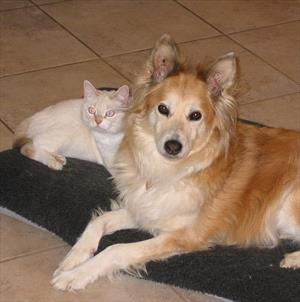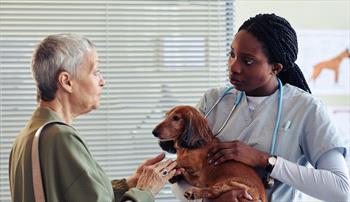Deciding to add a new animal to your family is an exciting time! It can be very rewarding to choose to adopt a dog or puppy from an animal shelter or rescue program. Not only will you be adding a wonderful companion to your family, but you will also be saving a life. There are still millions of shelter animals being euthanized annually in the United States that would have made wonderful family pets. Here are a few things to consider before, during, and after the adoption that can help ensure success.
Before Adopting
Rocky and Diamond

Photo Courtesy Dr. Teri Ann Oursler
Make sure you’re ready
Adopting an animal means that you are agreeing to be responsible for the animal’s care for many years to come. It is always smart to think ahead and consider what might change in your life and how you will be able to ensure that you meet your new dog’s needs as a beloved family member. Veterinary care, nutritional needs, exercise requirements, and how well the dog will blend with children and other family members are all important considerations.
Research what type of dog is right for you and your family
Many factors may play into the type of dog you seek to adopt. Breed, energy level, sociability, haircoat, age, your personality, and lifestyle are just a few. Many shelters are experienced at helping to make lasting matches and may even have standardized, research-backed questionnaires for you to fill out to help with this process.
Learn about your local shelters and rescues
Most areas have more than one animal welfare organization and each may have different missions and philosophies. You may wish to give your adoption support to the agency your philosophies align with the best. Consider asking your regular veterinarian about the local shelters. Chances are, they’ve examined animals from most of the nearby facilities. They will have opinions about the health and well-being of newly adopted animals and about shelter operations. It can also be useful to ask friends what their experiences have been. Ultimately, you should not only feel great about the dog or puppy you are bringing home, but also about the organization you choose to support through your adoption. There are many things to learn about and consider!
During the Adoption
What to expect
Rescues and shelters take variable approaches to the adoption process. Some require you to fill out involved questionnaires and will call landlords and perform reference checks. Others take a more open, trusting, and conversational approach. Some shelters will send animals home the first day you visit and others take a slower approach. It can be helpful to familiarize yourself right away with how the shelter you visit works so you won't be disappointed after you've matched with a dog.
Almost all shelters will require their animals to be spayed/neutered before adoption. Many shelters will have already performed the surgery before animals are made available for adoption, while others wait until adoption papers have been signed. This is also something you may want to find out about early on. Less commonly, shelters will send animals home with a voucher or other system and require spay/neuter at some point after adoption. It can be helpful to try to keep an open and compassionate mind during the adoption process. Remember that shelters are busy and chaotic places not only for the animals they house but also for the humans that work there.
What to ask
Once you have found a dog that you are interested in, ask the shelter for as much information as can be provided! Get a complete history, but recognize that sometimes there is not much information known. Find out when and where the shelter obtained the dog; was it brought in as a stray, surrendered by an owner, transferred from another shelter, or in some other situation? Ask what is known about the previous living situation and how the dog has behaved since being at the shelter. You should also be shown the medical records the shelter has kept since intake (and any previous records that might exist). You will want to ask about any ongoing medical issues, whether the dog is on any medication, and if there are known medical issues what anticipated care will be required. Inquire about what sort of follow-up services the shelter offers such as health insurance, microchipping, obedience training, or consulting for behavioral issues or medical issues. Finally, be sure to ask about return policies as it is important to know what options exist if the adoption does not work out.
After the Adoption
Vetvisit

Veterinary visit
Although many sheltering organizations have staff veterinarians, many do not. The level of veterinary care can be advanced to non-existent. No matter what exists in the shelter your dog comes home from, it is always wise to schedule an appointment to see your regular veterinarian soon after adoption. Illnesses such as upper respiratory infection and diarrhea are quite common in the early period after adoption due to the stress of shelter stays, and your veterinarian can help provide appropriate care so that your new friend recovers optimally. Vaccination boosters, parasite examinations, microchip implantation, and other important preventive care may also be needed during the early time after arriving home.
Be patient
It can take weeks for a new dog to adjust to a new home, yard, family, and environment. Keeping things quiet for a week or so, learning about and employing crate training, and establishing a solid routine can help. Especially for an older dog, patience during the initial adjustment period, and offering enrichment (opportunities to play, learn and explore new things) often pays off in spades once the dog settles in!
Use your Community Resources
Finally, don’t be afraid to ask for help if things aren’t perfect initially or if you have questions. The shelter you adopted from will ideally be your first source of information and happy to hear from you and to provide support!